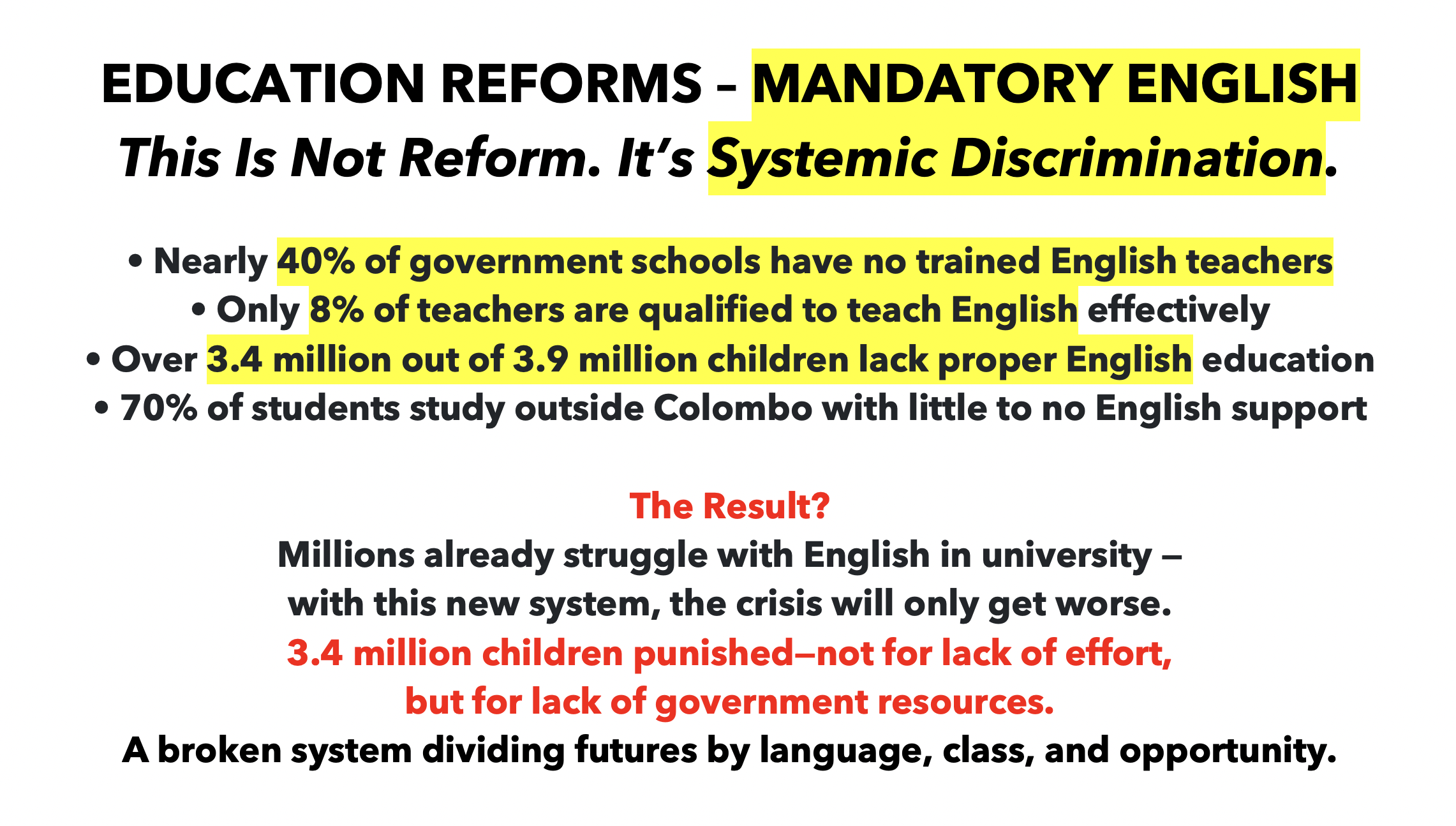Education Reform “Mandatory English” Discriminates 87% of Sri Lanka’s Children (3.4million)

Sri Lanka has approximately 3.9 million school children enrolled across 10,155 government schools (including 373 national and 9,782 provincial schools). Out of this, around 3.4 million children—87% of the total—are not fluent in English, with the vast majority coming from rural and under-resourced areas. Compounding this, nearly 40% of government schools—over 4,000 institutions—have no trained English teacher at all, depriving millions of children of access to proper English education. Despite this, the 2025–2029 Education Reforms make English a mandatory subject with heavy credit weighting in exams. This policy doesn’t level the playing field. It condemns the majority of students to systemic educational discrimination, not because of their abilities, but because of inequitable access. This is not education reform. It is the construction of a new educational caste system—dividing children by language, class, and geography.
Education Reforms Sri Lanka PPT for 2025.07.11 for Parliament new
The Ground Reality: Numbers That Shatter the Myth of ‘Equal Opportunity’
- 87% of Sri Lanka’s Children (3.4 Million) do nothave proper English teacher access — i.e., 4 million out of 3.9 million students.
- Nearly 70% (2.7m) of Sri Lanka’s 3.9 million schoolchildrenattend under-resourced schools outside Colombo and major urban centers—where English teacher shortages and poor infrastructure are rampant. (geographic & economic disadvantage)
- Over 4,000 out of 10,155 government schools (nearly 40%)—educating approximately 1.5 million mostly rural children—do not have even a single trained English teacher, effectively denying them access to quality English instruction.
- Less than 25% of Sri Lankans speak English fluently. Most fluent speakers come from urban, affluent, or English-medium backgrounds, leaving the vast majority—especially rural children—at a deep disadvantage.
- More than 2,000 rural schools have been shut down or amalgamatedin the past 20 years due to teacher shortages and facility neglect, pushing children to travel farther—or drop out entirely.
- According to the Ministry of Education, only around 19,000 out of 248,000 teachers (under 8%) are qualified to teach English effectively.
Despite these clear, systemic shortcomings, the 2025–2029 education reforms make English mandatory, with heavy credit weighting in exams.
This is not educational upliftment—it is educational sabotage by design.
Why This Matters:
• Nearly 40% of government schools lack trained English teachers, disproportionately disadvantaging about 1.5 million mostly rural students—almost 40% of the total student population.
• The grading system heavily weights English, meaning failure in this subject can significantly lower a student’s overall score, blocking access to scholarships, university admissions, and technical/vocational training.
• This entrenches a two-tier education system where urban and affluent students thrive, while rural, under-resourced students face systemic marginalization—deepening social, economic, and regional inequalities.
A poor English result can irreparably damage a student’s GPA, closing doors to scholarships, university placements, and career opportunities—even if they excel in all other subjects.
Making English a ‘Mandatory’ subject will result in
Structural Disadvantage from Grade 1 onwards
-
- Children in rural areas begin schooling without English instruction.
- Urban children with private tutors and access to English media get a head start.
- The new credit-based marking system assigns significant weight to English, meaning failure to perform well in this one subject can drastically lower a child’s overall GPA—regardless of their talents in science, maths, or languages.
Example A:
Amara, age 10, from a village school in Anuradhapura, has no English teacher. She scores 90+ marks in all other subjects but barely passes English due to lack of instruction. Under the new system, her overall GPA reduces, costing her scholarships and future opportunities—despite her academic potential, Amara feels discouraged and hopeless, seeing her efforts nullified by a subject she has no support to learn.
Destroys Meritocracy
A child from Monaragala or Kilinochchi scoring high in all subjects but failing English (due to lack of a teacher or facilitates) will fall below the qualifying threshold for scholarships, university entrance, or vocational pathways.
This is not a failure of the child—it is a failure of the system. A system designed to fail the child who doesn’t know English.
Example B:
Santhosh, age 11, from a plantation school in Nuwara Eliya, struggles with English because his school lacks proper teachers and resources. Despite excelling in Maths and Science, he fails to qualify for advanced programs, eventually dropping out, feeling education is “not for people like him.” A promising child is destroyed by the education system. This systemic failure not only destroys individual dreams but also entrenches poverty and marginalization in plantation communities.”
Forces Cultural and Psychological Alienation
-
- When success is tied to English proficiency, children begin to devalue their mother tongue and culture.
- English illiteracy becomes equated with “stupidity,” fostering inferiority complexes and deepening class divides and creating a revenge/hate culture. The current university system too breeds this and the ruling party should know this & it is baffling why they wish to make the situation worse when they too were victims.
- It subtly promotes the idea that to be “modern” or “intelligent,” you must abandon your national identity, mother tongue and imitate the West.
Example C:
Naveen, age 9, attends a private English-medium school in Colombo where he has daily English lessons, access to private tutors, and watches English-language TV shows and YouTube educational content at home. He easily masters the language and scores top marks in English, gaining praise from teachers and peers. This advantage helps him secure prestigious scholarships and university placement opportunities in the future—opportunities that are practically out of reach for many rural children without similar resources.
Meanwhile, his rural classmate Amara, from a village school with no trained English teacher, no exposure to English media, and limited internet access, struggles to understand even basic English vocabulary. Despite excelling in math and Sinhala, Amara’s academic future is jeopardized because she cannot compete on equal footing in English, leading to systemic marginalization and a growing class divide.
Intentional Inequality or Gross Negligence?
Let us be clear: You do not make a subject compulsory without first ensuring infrastructure, trained teachers, and equal access.
So why has the government gone ahead with this?
- To satisfy foreign donors’ loan conditions (World Bank, IMF, ADB) demanding mandatory English aligned with global ‘quality education’ and ‘gender equality’ agendas—disregarding Sri Lanka’s realities.
- To meet SDG 4and SDG 5 goals, which emphasize English as a vehicle for “quality education” and “gender equality”—but without regard to national context & the damage that it will cause even short term.
- To groom children to become globalist individuals, fluent in English but disconnected from their roots, culture, and nation. Boarders / Tenants of a Nation.
This is not an accident. This is by design.
This is an externally imposed agenda that undermines Sri Lanka’s educational sovereignty.
Real-World Consequences
- Student A, from Colombo: Access to international schools, English media, and private tutoring. Thrives in English-heavy curriculum.
- Student B, from rural Polonnaruwa/Vanni: No English teacher, no exposure at home. Struggles, fails English, and is blocked from higher education—despite excelling in other subjects.
These are no Education Reforms. This is the New Education Caste System —defined not by birth, but by access to English.
This Is Not Education Reform. It Is Educational Apartheid.
Forcing all students to learn English—even in schools without English teachers or infrastructure—creates a system of unequal educational opportunity, violating constitutional rights to equality and equitable access to education.
The reform also disrupts the constitutional balance between national languages and English as a link language, redefining English from a facilitative tool into a mandatory requirement.
Relevant Constitutional Articles:
• Article 12 – Right to equality and non-discrimination.
• Article 21 – Protection of educational opportunities.
• Article 27(2)(h) – Obligation to ensure equitable education.
• Articles 10 & 14(1)(f) – Right to cultural identity and expression through language.
• Article 22(1) – Recognizes English only as a link language, not a compulsory subject.
These are not mere technicalities—they represent fundamental violations of Sri Lanka’s constitutional framework and citizens’ rights.
The government’s decision to prioritize English without first addressing teacher shortages and infrastructure gaps is not modernization—it is institutionalized discrimination.
It deliberately:
• Punishes poor and rural children
• Rewards privileged and urban children
• Destroys language equity
• Undermines national pride
• Turns English into the new “intelligence test,” undermining the rightful place of mother tongues
Fix the System First—or Stop the Reform
Sri Lanka’s children are not lab rats for foreign-funded social experiments. Unless urgent steps are taken to provide equal resources and trained teachers nationwide, this reform must be halted. No child should be punished for circumstances beyond their control.
Our nation’s future depends on equitable education that respects our heritage and uplifts all children, not just the privileged few.
Before English is made mandatory:
• Train and deploy thousands of qualified English teachers nationwide
• Provide adequate resources equally across all schools
• Ensure every child has a fair chance—regardless of postcode or social class
Until these conditions are met, making English compulsory is a crime against educational justice.
No mandatory English unless every child has equal access.
This is not a battle about language. It is a battle about fairness, identity, and the future of Sri Lanka’s children.
Shenali D Waduge







